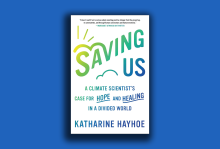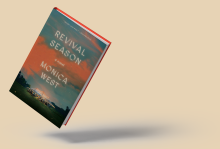Arts & Culture

OVER THE LAST year we’ve had to reconsider our definition of what makes a “sacred space.” When churches and temples closed due to the pandemic, our homes became places of worship for many of us.
This cemented what’s always been true: Sacred space is a fluid thing. It can be a place of deep personal meaning or shared memories with people we care about. A sacred space doesn’t even need to be a physical location. It could also be the spiritual space created whenever we’re with those we love or remember people we’ve lost.
Céline Sciamma’s tender film Petite Maman speaks to this. A little girl, Nelly (Joséphine Sanz) and her mother, Marion (Nina Meurisse), grieve the death of Marion’s mother and clean out Marion’s childhood home. Sciamma’s movie becomes a meditation on everyday sacred spaces, including those that can exist within mother-daughter relationships.

AS NEW YORK CITY'S elected public advocate since 2019, Brooklyn native Jumaane Williams is the ombudsman for more than 8 million people in all five boroughs, charged with overseeing city agencies and investigating citizen complaints. And, starting in 2016, when he was a member of the New York City Council, he has performed in more than 40 staged readings of plays, most of them classical tragedies, with Theater of War Productions.
Starting in 2009 with a performance of scenes from “Ajax” and “Philoctetes” by Sophocles that highlighted the issue of military PTSD, Theater of War Productions has presented dramatic readings of classical Greek tragedies and other plays followed by guided discussions linking their themes to contemporary social issues. It now has a repertory of more than 20 works addressing a wide range of complex social issues—from racism to refugees, gun violence to sexual assault, frontline medical worker mental health to criminal justice, and more. Essential to the experience are post-performance discussions in which audiences engage with the play’s themes, creating cathartic release and deepening understanding. During the pandemic, Theater of War has gone online, reaching a vast international audience.

Cypriot artist George Gavriel almost lost his job as a high school headmaster after his works depicting Jesus in unconventional settings and also taking a swipe at politicians drew the wrath of religious and government leaders.
Gavriel, 62, uses his art as a protest medium to take aim at what he considers the ills of society.

The most incredible part of landing on the moon is not the making it there, but the safely making it back. NASA’s missions to the moon and back were feats of engineering, math, and creativity. The stories are oft retold from a variety of angles and perspectives, and I will never tire of it.
Some people may not know that when we went to the moon, we left a lot of junk there. Lighter space crafts can escape gravity easier, so anything that didn’t need to come home didn’t. Included on the list of things that didn’t need to come back from Apollo 11 through Apollo 17: Twelve Hasselblad camera bodies and lenses. (Another fun fact: Until recently, one of the cameras that was supposed to return had been missing for nearly 50 years.)

One of the best things I ever found at Goodwill was a complete set of all Sir Arthur Conan Doyle’s Sherlock Holmes stories — a major coup for middle-school, mystery-loving me. Unfortunately, the books smelled as if they had spent a few decades in the smoke-infused den of Holmes’ Baker Street lodgings. I sandwiched dryer sheets between the pages and read them all cover-to-cover.

What kind of parent raises a mass murderer? What would the aftermath of a school shooting be like for the parents of the child who shot his classmates and then took his own life. Unimaginable? Mass, Fran Kranz’s writing and directorial debut, immerses viewers in these questions, challenging us to consider our capacity for forgiveness.

Ah, the sweet escapism of sci-fi and fantasy. From The Hunger Games to The Force Awakens, women and people of color are presidents, space commanders, and leaders of the resistance without protest or fanfare from those around them. Dystopian America and a Galaxy Far Far Away know no racism or sexism, it seems. But that’s not necessarily a good thing for those of us in the audience. As Atencio wrote of For All Kind, “The willingness to embrace fictional diversity … but an unwillingness to deal with the tensions that would follow, is maybe the farthest stretch on the show.”

Midnight Mass is the latest from horror filmmaker Mike Flanagan (creator of The Haunting of Hill House and The Haunting of Bly Manor), who excels in slow-creeping, character-based horror. It’s also a project through which Flanagan, a former Catholic, processes his feelings about scripture, religion, and the church. As an artistic representation of someone deconstructing their faith, Midnight Mass employs horror tropes to explore the ways religion responds to pain, both in ways that heal and ways that destroy.

What does a trailblazing Episcopal priest, a lawyer whose work helped to shape the Brown v. Board of Education case, a founding member of the National Organization for Women (NOW), and a close friend of Eleanor Roosevelt all have in common?
They are all the same person. And My Name Is Pauli Murray, a new documentary from Amazon Studios, tells the fascinating story.

Carlile believes that we each have our own definition of the word forgiveness. But for her, forgiveness is “a willingness to look foolish to those who don't understand. It looks like naivety. It looks like being a doormat. It looks like being walked on, but it's so much more radical than that.”

Last week, I told my colleagues that I never struggle to write these introductions. As you can predict, that meant this week’s introduction became extremely hard to write — as I deserve. The job of this introduction is to briefly whet your appetite, give you some connecting thread for our recommended stories, and maybe say something profound. I'm learning, however, that not every story needs a moral.

I will teach you by the river,
I will name the place to meet,
how quick is the water;
I am the harvest: come gather and eat!

AMONG THE MANY postures toward climate change, I am in the “alarmed” camp. I see indicators of a planet on the verge of widespread ecosystem collapse and want to sound the bells for everyone else to wake up and do something. Unfortunately, writes climate scientist Katharine Hayhoe, some of the ways we try to wake people up can have the opposite effect.
Saving Us expands on Hayhoe’s popular TED Talk on the most important thing you can do about climate change: talk about it. The book explores why piling on sobering facts and predictions can make someone dismissive about climate change even more antagonistic, and even make those who are concerned and alarmed check out in despair. Though Hayhoe includes plenty of climate science, what makes this book worth reading are the insights she shares from social science.

FOR 12 YEARS, the Hortons have spent their summers on the revival circuit, driving hundreds of miles from one small city to another. Samuel Horton, a Black Baptist preacher famous for his healing, is proud of the souls he has won for the Lord and prouder of the power he wields. Still, he yearns for miracles no one would question, that would wipe away any doubt in his ability. If only he could heal his younger daughter, Hannah, who has cerebral palsy. If only his wife could give him another son, especially after their second son, Isaiah, was stillborn. In his pride, Samuel blames the women around him for his own limitations, even as he relies on them to hold together the picture of faith he has carefully constructed.
Behind the scenes of Samuel’s performance is 15-year-old Miriam Horton, the narrator of Monica West’s Revival Season. When the novel opens, Miriam is in awe of her father’s position and power, despite questioning the limited roles women hold in her community. As she helps raise Hannah and supports her mother, she memorizes her father’s prayers and sermons, carefully stud-ying his process. She particularly envies her younger brother Caleb, who has the privilege of shadowing their father. Still, she prays that the scandal of the previous summer—when her father injured a pregnant girl he was meant to heal—does not follow them into the new season.

DEEPFAKES—DIGITAL CREATIONS in which people appear to be saying and doing things they never did or said—have been around for a while now, mostly as jokey, obviously satirical clips on the internet. In the past decade, the technology has been widely used in entertainment. Carrie Fisher was faked into Star Wars: The Rise of Skywalker. A hologram of Tupac Shakur headlined the 2012 Coachella festival, one of Whitney Houston is about to play Vegas, etc. But this year, in Roadrunner, a documentary about the late celebrity chef Anthony Bourdain, a line was crossed.

Unsung Belonging
Serenade is a collaborative album dedicated to LGBTQIA+ youth of faith. Produced by Gretta and Kyle Miller of the band Tow’rs, this multigenre and multiartist project explores the “hope and heartbreak” of living as a queer person of faith. Beloved Arise Media.

I WOULDN'T WISH on anyone the narrative dilemma facing the writers of United States of Al. The CBS show is a buddy comedy about a young Afghan man who finally gets a visa to come to the U.S., thanks to a Marine, Riley, for whom he was an interpreter during the Afghanistan War, whose life he saved, and with whom he’s living in the States. But United States of Al’s second season, with an Oct. 7 premiere, may need to encompass even more grief than its predecessor. The U.S. has withdrawn from Afghanistan, and the Taliban has taken over. We’ve seen the video of Afghan people trying to hold on to a U.S. military plane as it takes off, the clip ending right before some of them fall. Human remains were later found in the plane’s wheel well. What will happen when United States of Al’s protagonist sees that video?

ONE DOES NOT need to look hard to find a new myth forming about the great beyond. The narrative is that space travel will solve our woes—specifically the woes of racial capitalism. And this myth is appearing everywhere, in reality and fiction.
Take, for example, billionaire Richard Branson’s comments before Virgin Galactic’s suborbital mission in early July.
“Imagine a world where people of all ages, all backgrounds from anywhere, of any gender, or any ethnicity have equal access to space,” Branson told the press. “And they will in turn, I think, inspire us back here on Earth.”
Branson and fellow billionaire Jeff Bezos are in a 21st century space race, trying to justify their extreme spending to commercialize the cosmos with the idea that space travel can dissolve a litany of struggles.
The new space race is not so different from the first—the winner advances their power and reach. Between the 1950s and 1970s, the United States and the Soviet Union raced to space, then to the moon, largely for the same reason. The U.S., it might be said, won the space race by being the first to the moon (and we are still the only nation to have ever put people on the moon).
But what if things were different? This is the question explored by For All Mankind (Apple TV+), which released its second season in April. It is an exploration of a world in which the Soviets win the race to the moon, thereby extending the space race in perpetuity. The first season takes place in the ’70s, the second jumps to 1983, and the decade-jump trend will continue for all seven seasons, according to the creators.

“Trying to make our lives meaningful all the time is so stupid,” says Kate Bowler. “We can’t make every minute into a moment. Sometimes you just have to pay bills and show up for your friend and listen to her talk again about whether she should dump her boyfriend — and she should — and be in a faculty meeting and be in traffic.”
